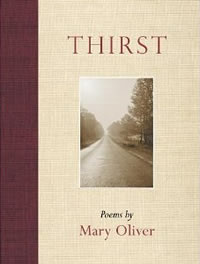Book Notes
 Mary Oliver, Thirst (Boston: Beacon Press, 2006), 71pp.
Mary Oliver, Thirst (Boston: Beacon Press, 2006), 71pp.
In 2007 the New York Times described Mary Oliver as "far and away, this country's [America's] best-selling poet." In addition to twenty volumes of poetry, Oliver has published eight volumes of prose and two audio books. Among her numerous awards, her collection "American Primitive" (1984) won the Pulitzer Prize for poetry, while "New and Selected Poems" (1992) won the National Book Award.
Oliver is best known as a nature poet, and these forty-three poems exemplify that well-earned reputation. She is known for her solitary walks near her home in Provincetown, Massachusetts, and how those walks provide a rich fund of material for her to observe, ponder, and rejoice in the physical creation: "My work is loving the world," she writes in the the first poem of the book, "Messenger." If we still our busy minds and pay attention, the physical creation provokes in us astonishment, joy, and gratitude. Not that Oliver ignores the darkness. Other poems speak of unrequited love, brokenness, darkness, and "the dull, brutish ways of mankind."
The book is dedicated to Oliver's partner of forty years, Molly Malone Cook (1925–2005), and was published about a year after Cook died. Several poems speak of her grief: "I have not forgotten the Way, but, a little, the way to the Way" ("After Her Death"). And then "What I Said at Her Service" —"When we pray to love God perfectly, / surely we do not mean only." What caught some Oliver fans by surprise in this volume, however, was that many of the poems are, as one reviewer put it, "overtly Christian."
There are poems about Gethsemane, the Eucharist, prayer, the donkey who bore Jesus into Jerusalem, and confessing that God was in Christ reconciling this beautiful but broken world to Himself. After all, "Everything is His." And again: "You cannot cross one hummock or furrow but it is His holy ground." One of my favorites is "Praying":
"It doesn't have to be
the blue iris, it could be
weeds in a vacant lot, or a few
small stones; just
pay attention, then patcha few words together and don't try
to make them elaborate, this isn't
a contest but the doorwayinto thanks, and a silence in which
another voice may speak."
Another favorite is the first stanza of "Six Recognitions of the Lord:" "I know a lot of fancy words. / I tear them from my heart and tongue. / Then I pray." And then the fifth stanza:
Oh, feed me this day, Holy Spirit, with
the fragrance of the fields and the
freshness of the oceans which you have
made, and help me to hear and to hold
in all dearness those exacting and wonderful
words of our Lord Jesus Christ, saying:
Follow me.
For Oliver, then, love of creation leads to worship of the Creator.


